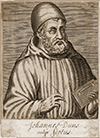4. About the Things Required on the Part of the Time
229. The third main point, on the part of the time [n.184].
Briefly, you may hold that mass is fittingly celebrated from the beginning of the day up to nones, calculating the beginning of the day not from the rising of the sun above our horizon but from the hour at which the solar rays illumine our hemisphere, which is called the beginning of the aurora (according to De Crepusculis59), when the sun is 10 or 8 degrees below the horizon, the ascent from which does not take more than the period of a full hour and a fifth of an hour. And this limit for celebrating then and not before is proved in Decretum p.3 d.1 ch.48, “On the holy sabbath [the night of the Lord’s nativity], about the beginning of night, the solemnities of the mass are to be celebrated.” And the reason is that that part of the artificial day, which is after nones on the holy sabbath, is computed along with the night preceding the Lord’s day. Hence in the blessing of the candle it is said, “God who this most holy night.” Now the end of celebration, namely the ninth hour [nones] is gathered from the custom of the churches; and this end is reached especially on days of fasting, when in collegiate churches the mass after fasting is regularly wont to be celebrated about the ninth hour.
230. Now this circumstance of time is accompanied by a certain necessity to mark a period of time in the celebration of an ordained mass, at whatever hour of the artificial day it is done, namely to read the introit, prayers, and epistle, as is noted in the missals according to the use of the Roman Church, without which preceding acts no one confects in the ordained way; nor perhaps absolutely could anyone confect (as said above in d.8 nn.66-71, 89-91) without first saying at least the words by which he would signify that he was pronouncing the words of consecration in the person of Christ, not in the proper person of the priest.

